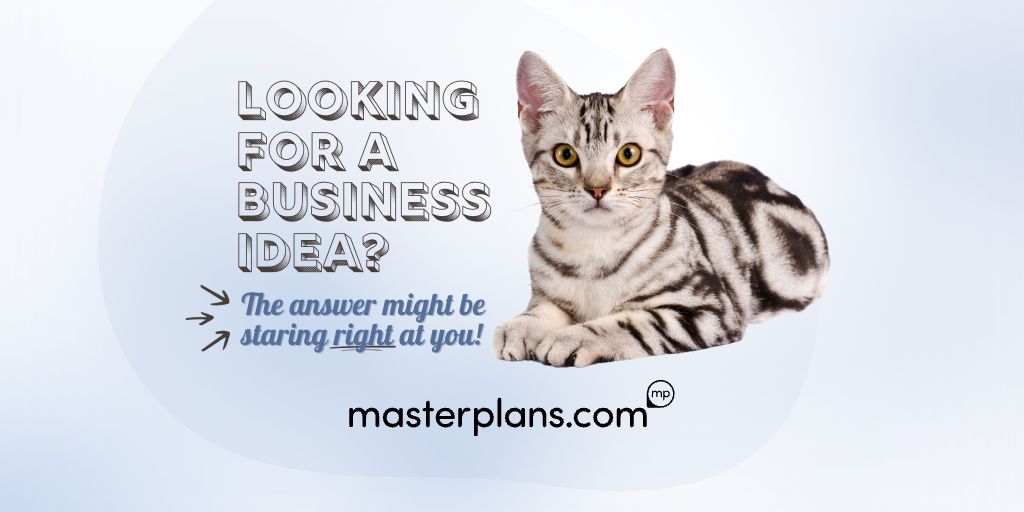How to Write a Management Summary for Your Business Plan
Entrepreneurs are often celebrated for their uncanny ability to understand others – their customers, the market, and the ever-evolving global...
4 min read
![]() Phoebe Whittington
Dec 6, 2022 11:03:16 AM
Phoebe Whittington
Dec 6, 2022 11:03:16 AM

You have the drive, the skills, and the entrepreneurial spirit. You want to be your own boss and build something. Maybe you’re already a business owner, but you feel ready to move on to something else. But the inside of your brain is just white noise. You have no good ideas for a business! Where on earth do you find them?
How do people become entrepreneurs? Do they attend an Ivy League school or work for giant companies? A quick Google search will give you blogs and articles that have identified some of the most important traits of successful entrepreneurs. These include decisiveness, leadership, competitiveness, drive, flexibility, and so on.
But many of these lists leave out some of the most important “soft skills” you can have: the ability to open your eyes and ears.
Good businesses solve problems. (Un)fortunately, there is no shortage of problems out there in the world, so if you can train your eye to recognize patterns of unmet needs in your community, state, country, or other niche audience, you’ll be able to find an idea, and that idea could turn into a business.
This blog post will show you how to draw inspiration for a solid business concept through the simple power of observation.
Okay, I lied a little bit. Learning to observe and figure out patterns actually takes some work and critical thinking skills. Like curiosity. Curiosity is one of the great drivers of innovation, and as researcher Brené Brown points out in her work, it is a skill you can develop.
Practicing curiosity will lead you to identify patterns you didn’t see before, ask interesting questions, and engage in effortful learning about a problem.
But there are some conditions you have to meet before you can become truly curious. First, realize that you don’t know what you don’t know. You can’t become curious about something if it’s not on your radar, so you’ll have to begin practicing curiosity with something you at least have some basic knowledge about. Louis Braille, for instance, invented the Braille system after having lived with his own blindness for years. He already understood the obstacles he faced because written language was largely inaccessible to him.

A savvy entrepreneur practicing curiosity.
If you live in a busy city with lots of cars, you may already understand how difficult it is to get around on foot or with public transportation. You may already be familiar with the bus routes, how often they get delayed, and which intersections just take forever for the light to change so you can cross.
From there, you can start to ask really interesting questions to get to the root cause of the issue. Is public transit affordable? Are the sidewalks big enough? Are there other ways for people to move around? Enough bus drivers? And these questions may lead you to other angles you hadn’t considered.
How many cars drive in this city? And how much air pollution does that add up to? Noise pollution? Car accidents? Bad traffic jams?
When you’re inconvenienced, frustrated, sad, angry, or annoyed by something that has happened, pay attention. Dig deeper into what is causing your strife, and you’ll find something interesting every time.
Go get a piece of paper or your Notes app out and think of three things in your day-to-day life that frustrate you.
Getting more curious about your own problems and experiences is a great start, but it will only get you so far. You are one person with a limited perspective. You won’t have the same challenges as everyone else. If the solution to a problem only works for people exactly like you, you probably won’t get many customers.
Empathy is a sorely underestimated skill to hone, especially in business. As Dr. Brown writes in her book, Dare To Lead, “…it’s only when diverse perspectives are included, respected, and valued that we can start to get a full picture of the world, who we serve, what they need, and how to successfully meet people where they are.” Being able to practice empathy means that you can reach a place of understanding not just what your prospective customer experiences, but also the complex feelings that go with them.
Getting curious about problems also means getting curious about other people. It means factoring others’ experiences into the solutions you create. This will let you better serve people through your business idea. Become an expert in helping, and you’ll develop a loyal customer base.
If you want to solve a problem that contractors experience, go ask contractors a lot of questions. If you want to solve a problem that nurses experience, go ask nurses a lot of questions. Even if you are a contractor or nurse yourself, talk to others in the field. They will have insight that you don’t.
Back to the car issue: maybe you talk to parents who are worried about their kids playing in high-traffic areas. Or someone who was hit by a car while trying to cross the road. Or someone who is chronically late for work because traffic is so bad. Other people's pain points may not look like your own, but they may share a root cause.
Find a friend, spouse, neighbor, or coworker. Interview them about the hardest part of their day-to-day life, what they wish was different, and what they would do if they didn’t have to waste time on it. Take detailed notes and look for common themes. Get curious and follow up for more details.
The overwhelming majority of the time you spend trying to solve a problem should be spent understanding the nature of the problem itself. The last 5% or so can be dedicated to thinking of solutions.
By the time you’ve gotten curious and empathetic, you’ve actually already done a lot of this work. Good problem solving involves understanding all of the underlying causes, what resources you have to work with, and who it impacts. Asking interesting questions and getting other perspectives are great ways to make sure you understand this issue inside and out. Your additional thinking time can be spent doing research and gathering data that offers more context. A map, for instance, might show you that traffic in one part of town is always backed up by 10-20 minutes on a Monday morning.
Returning to the car example: You’ve thought about it, gotten curious, done good research, and interviewed stakeholders. And maybe you arrive at the conclusion that reducing car traffic would go a long way toward solving several issues. But because you understand the problem so well, you know people can’t just start walking everywhere—the city infrastructure isn’t built for that.
So, you come up with an electric scooter ride-sharing concept. This is a solution that can adapt to the existing infrastructure, save people time, and reduce dependence on cars to lower air pollution.
Now obviously, this may not be exactly how scooter companies like Lime came into being, but you can trace the process at work here. As you move forward, keep in mind that observation isn’t a one-time thing. It’s something you’ll have to practice and make into a habit. But, if you stick with it and pay attention, you’ll be able to find some really interesting problems you can work with and turn into a great business concept.
If you’ve already begun to notice something interesting or develop a business idea, feel free to hit us up at Masterplans if you need any advice or a sounding board.

Entrepreneurs are often celebrated for their uncanny ability to understand others – their customers, the market, and the ever-evolving global...

Despite growth in sectors like artificial intelligence, venture capital funding has seen better days. After peaking at $347.5 billion in 2021, there...

Most people think of a professional business plan company primarily as a "business plan writer." However, here at Masterplans, we choose to approach...